Filter by

A Responsibility to the World: Saramago, Politics, Philosophy
In a 1987 interview, José Saramago eloquently expressed what could be considered his political-philosophical manifesto: “Human beings should not content themselves with the role of mere observers. They bear a responsibility to the world; they must actively engage and intervene.” In 1998 the celebrated writer was honoured with the Nobel Prize for Literature. So Saramago did not only as a hu…
- Edition
- 1
- ISBN/ISSN
- 978-3-7329-8985-0
- Collation
- 302
- Series Title
- iBroLiT – Estudos Iberorrománicos de Literatura e Tradutoloxía. Ibero-Romance Studies in Literature and Translatology
- Call Number
- -
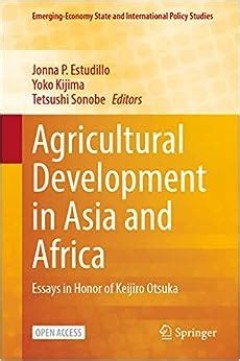
Agricultural Development in Asia and Africa: Essays in Honor of Keijiro Otsuka
This Open Access book explores the multifaceted nature of agricultural and rural development in Asia and examines the extent to which the Asian experience is being replicated in contemporary Africa. This volume compiles the works of top scholars who provided analyses and evidences from household-level surveys collected for many years in several parts of Asia and Africa. The most important findi…
- Edition
- 1
- ISBN/ISSN
- 9789811955426
- Collation
- XXXIII, 387hlm,: ill, lamp;
- Series Title
- -
- Call Number
- -
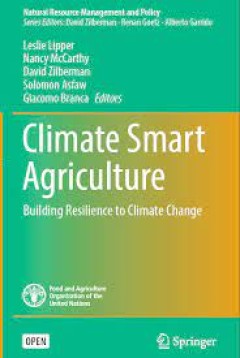
Climate Smart Agriculture : Building Resilience to Climate Change
The book uses an economic lens to identify the main features of climate-smart agriculture (CSA), its likely impact, and the challenges associated with its implementation. Drawing upon theory and concepts from agricultural development, institutional, and resource economics, this book expands and formalizes the conceptual foundations of CSA. Focusing on the adaptation/resilience dimension of CSA,…
- Edition
- -
- ISBN/ISSN
- 9783319611945
- Collation
- XVIII, 630 halaman
- Series Title
- Natural Resource Management and Policy
- Call Number
- 630 CLI
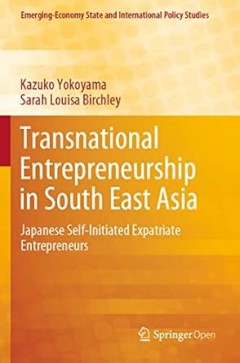
Transnational Entrepreneurship in South East Asia
Professor Yokoyama is the Dean of the Graduate School of Business Administration, Toyo Gakuen University, Tokyo, Japan, where she supervises research in the field of human resource management in Japanese companies by drawing comparisons between Japanese-style employment management and the merit-based systems. Her recent research is concerned with Japanese self-initiated expatriate entrepreneurs…
- Edition
- 1
- ISBN/ISSN
- 9789813292529
- Collation
- XXI, 220, hlm,: ill, lamp;
- Series Title
- -
- Call Number
- -
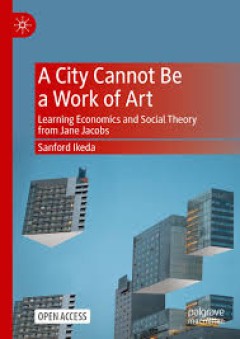
A City Cannot Be a Work of Art
This open access book connects Jane Jacobs's celebrated urban analysis to her ideas on economics and social theory. While Jacobs is a legend in the field of urbanism and famous for challenging and profoundly influencing urban planning and design, her theoretical contributions – although central to her criticisms of and proposals for public policy – are frequently overlooked even by her most…
- Edition
- -
- ISBN/ISSN
- 978-981-99-5362-2
- Collation
- XXV, 400
- Series Title
- -
- Call Number
- -

Inorganic Constituents in Soil
This open access book is a must-read for students of and beginners in soil science. In a well-organized and easy-to-follow manner, it provides basic outlines of soil minerals, new methods and recent developments in the field, with a special focus on visual aids. The chapters on primary minerals, secondary minerals, non-crystalline inorganic constituents and inorganic constituents sensitive t…
- Edition
- 1
- ISBN/ISSN
- 9789811312144
- Collation
- xi, 181 hlm,: ill, lamp; 21 cm
- Series Title
- -
- Call Number
- -

Writing Manuals for the Masses
This open access collection of essays examines the literary advice industry since its emergence in Anglo-American literary culture in the mid-nineteenth century within the context of the professionalization of the literary field and the continued debate on creative writing as art and craft. Often dismissed as commercial and stereotypical by authors and specialists alike, literary advice has non…
- Edition
- 1
- ISBN/ISSN
- 978-3-030-53614-5
- Collation
- -
- Series Title
- New Directions in Book History
- Call Number
- XXII, 412

Early Public Libraries and Colonial Citizenship in the British Southern Hemis…
This open access Pivot book is a comparative study of six early colonial public libraries in nineteenth-century Australia, South Africa, and Southeast Asia. Drawing on networked conceptualisations of empire, transnational frameworks, and ‘new imperial history’ paradigms that privilege imbricated colonial and metropolitan ‘intercultures’, it looks at the neglected role of public librarie…
- Edition
- 1
- ISBN/ISSN
- 978-3-030-20426-6
- Collation
- -
- Series Title
- New Directions in Book History
- Call Number
- XVII, 159
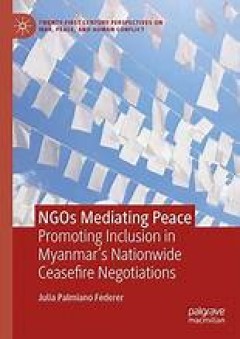
NGOs Mediating Peace
This book explores the role of nongovernmental mediators in promoting “inclusive peace” to negotiating parties in Myanmar’s Nationwide Ceasefire Agreement (NCA) negotiations from 2011-2015. The influx of NGO mediators directly engaging with the negotiating parties and promoting the inclusivity norm coupled with the salience of discourse around “all-inclusiveness” at the end of the NCA…
- Edition
- 1
- ISBN/ISSN
- 978-3-031-42174-7
- Collation
- -
- Series Title
- Twenty-first Century Perspectives on War, Peace, and Human Conflict
- Call Number
- XXI, 218
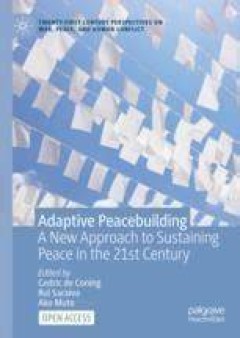
Adaptive Peacebuilding
This open access book responds to the urgent need to improve how we prevent and resolve conflict. It introduces Adaptive Peacebuilding through evidence-based research from eight case studies across Africa, Asia, the Middle East, and Latin America. It also considers how China and Japan view and practice peacebuilding. The book focuses on how peacebuilders design, implement and evaluate programs …
- Edition
- 1
- ISBN/ISSN
- 978-3-031-18219-8
- Collation
- -
- Series Title
- Twenty-first Century Perspectives on War, Peace, and Human Conflict
- Call Number
- XXVII, 321
 Computer Science, Information & General Works
Computer Science, Information & General Works  Philosophy & Psychology
Philosophy & Psychology  Religion
Religion  Social Sciences
Social Sciences  Language
Language  Pure Science
Pure Science  Applied Sciences
Applied Sciences  Art & Recreation
Art & Recreation  Literature
Literature  History & Geography
History & Geography